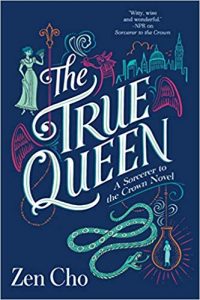Gary K. Wolfe Reviews The True Queen by Zen Cho
 The True Queen, Zen Cho (Ace 978-0-425-28341-7, $15.00, 384pp, tp) March 2019.
The True Queen, Zen Cho (Ace 978-0-425-28341-7, $15.00, 384pp, tp) March 2019.
If G. Willow Wilson offers some insightful contrasts between Islamic and Christian legend, Zen Cho, in her follow-up novel to Sorcerer to the Crown, does something a bit similar with Malaysian vs. English views of magic and faerie. In The True Queen, we learn that the command central of the spirit realm is called the Fairy Court by the Malaysian characters and the Palace of the Unseen by the British, presided over by either the Queen of the Djinns or the Fairy Queen. But apart from nomenclature, it seems to be the same place, and a magical curse seems to work just fine across cultural barriers. Such a curse is what sets off the plot of this enjoyable but somewhat less acerbic sequel, which begins on the Malaysian island of Janda Baik, where two young women awaken on the beach after a massive storm, barely remembering their names and not much else, but concluding they must be sisters named Muna and Sakti. They make their way to Mak Genggang, the powerful but kindly witch who we met in the first novel, who suspects they are victims of a curse which may have originated in England (Malaysia was at the time occupied by the British). The situation is somewhat urgent, since Sakti, who has some magical powers of her own, seems in danger of disappearing (there’s a growing, see-through hole in her middle). Following the instructions from the old witch, the sisters set out, taking a shortcut to England through the Unseen Realm – fairyland itself – but, in good fairytale form, Sakti decides to disobey one of the instructions and suddenly disappears. Muna ends up in England, at the academy of the Sorceress Royal, Prunella Wythe, who gained the position back in Sorcerer to the Crown.
Prunella and her husband Zachariah, whose adventures were the focus of that novel, are mostly secondary characters here, as Muna seeks not only to find the source of her curse, but to find a way of rescuing her sister from the Unseen Realm, which she is repeatedly told is pretty unlikely, given the tense relations between England and the Fairy Court. To make matters worse, a rather bombastic figure with the delightful name of the Duke of the Navel of the Seas shows up from Fairyland threatening to kill all the English magicians and sack the country, in an effort to reclaim a talisman called the Virtu, which he says has been stolen from the Fairy Queen. The Duke turns out to be not quite what he seems, but neither does anyone else in the novel, which rapidly expands from the mystery of the girls’ curse to an epic battle for the rightful control of Fairyland, involving shapeshifting dragons and serpents, dueling hexes, magical rabbits, and slave-spirits called polongs. Just to keep us grounded, barely, in Regency romance territory, there is a fairly minor subplot involving Prunella’s (and Muna’s) closest friend, who is about to enter a loveless marriage in order to save her family’s fortunes.
The social and political satire involving race, gender, and colonialism that gave such a sharp and surprising edge to Sorcerer to the Crown is mostly relegated to the background here, even though an early chapter draws a telling contrast between the English raja’s luxurious house in Malaysia and the lives of the subjects who live there. When Prunella tries to eject a member of the magicians guild – the Royal Society of Unnatural Philosophers – for his demeaning comments about her female students, she’s visited by an outraged father (the same one who wants to marry his daughter off for financial survival), defending the culprit in tones that sound like a #MeToo lawyer: “To ruin Mr. Hobday for a mere slip is surely disproportionate to his crime.” Prunella is no less committed a defender of women’s equity than in the first novel, but having cemented her position as Sorceress Royal, she has less to do here, and the battle to determine the true queen of Fairyland, which involves some impressive large-scale setpieces in both the mundane and fairy worlds, provides a bit less room for social commentary. Even though I suspect many readers will suss out some key secrets long before the characters do, The True Queen is a lot of fun, ingeniously and carefully plotted, with some engaging and moving examples of the value of friendship and the moral dilemmas of power. It may be a more conventional fantasy than Sorcerer to the Crown, but it handles its conventional elements with flashes of brilliance, and it shares with that novel some telling reminders of the importance of the voice of the outsider.
Gary K. Wolfe is Emeritus Professor of Humanities at Roosevelt University and a reviewer for Locus magazine since 1991. His reviews have been collected in Soundings (BSFA Award 2006; Hugo nominee), Bearings (Hugo nominee 2011), and Sightings (2011), and his Evaporating Genres: Essays on Fantastic Literature (Wesleyan) received the Locus Award in 2012. Earlier books include The Known and the Unknown: The Iconography of Science Fiction (Eaton Award, 1981), Harlan Ellison: The Edge of Forever (with Ellen Weil, 2002), and David Lindsay (1982). For the Library of America, he edited American Science Fiction: Nine Classic Novels of the 1950s in 2012, with a similar set for the 1960s forthcoming. He has received the Pilgrim Award from the Science Fiction Research Association, the Distinguished Scholarship Award from the International Association for the Fantastic in the Arts, and a Special World Fantasy Award for criticism. His 24-lecture series How Great Science Fiction Works appeared from The Great Courses in 2016. He has received six Hugo nominations, two for his reviews collections and four for The Coode Street Podcast, which he has co-hosted with Jonathan Strahan for more than 300 episodes. He lives in Chicago.
This review and more like it in the March 2019 issue of Locus.
 While you are here, please take a moment to support Locus with a one-time or recurring donation. We rely on reader donations to keep the magazine and site going, and would like to keep the site paywall free, but WE NEED YOUR FINANCIAL SUPPORT to continue quality coverage of the science fiction and fantasy field.
While you are here, please take a moment to support Locus with a one-time or recurring donation. We rely on reader donations to keep the magazine and site going, and would like to keep the site paywall free, but WE NEED YOUR FINANCIAL SUPPORT to continue quality coverage of the science fiction and fantasy field.






